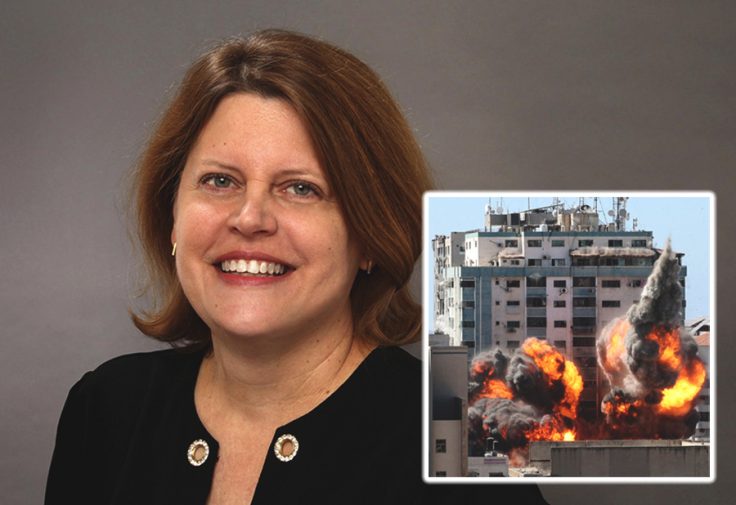Days after the Washington Post tapped Sally Buzbee to replace Marty Baron as executive editor, the Associated Press boss finds herself mired in controversy as the organization she has helmed since 2017 is under fire for knowingly associating with terrorists.
The Post announced Buzbee's hiring on May 11 to the delight of journalists and other liberal proponents of representational diversity. Buzbee will be the first woman to serve as top editor of the Jeff Bezos-owned publication. The initial fervor over the announcement, however, was quickly overshadowed by criticism of the AP's ties to Hamas, the Iranian-backed terrorist organization behind the recent spate of violence in Israel and the Palestinian territories.
The controversy began on May 15 after Israeli airstrikes destroyed the Jala Tower in Gaza City. The 12-story complex was home to a number of Hamas operations, including weapons manufacturing and military intelligence, as well as the Associated Press and other media organizations. According to national security expert Noah Pollak, the AP's local reporters knew of the terrorist group's presence in the office building.
Buzbee denied the AP, which has maintained offices in the Jala Tower for 15 years, was ever aware of the Hamas operations in the building, and demanded an independent investigation into the matter. "We are in a conflict situation," Buzbee said in an interview with the AP. "We do not take sides in that conflict. We heard Israelis say they have evidence; we don't know what that evidence is."
Buzbee's remarks echoed those of AP president and CEO Gary Pruitt, who said the organization was "shocked and horrified" by the Israeli airstrike and had "no indication Hamas was in the building." Pruitt said the proximity of active terrorist operations was "something we actively check to the best of our ability" and insisted the AP "would never knowingly put our journalists at risk."
Exclusive Look Inside Jala Tower, the AP-Hamas Coworking Space Destroyed by Israeli Airstrike
The AP's denials notwithstanding, evidence suggests the organization's due diligence was less than thorough. Matti Friedman, a former AP correspondent based in Jerusalem, has written extensively about his experiences covering the Israeli-Palestinian conflict on the ground. In a 2014 article published in the Atlantic, for example, Friedman explained how news coverage of the region was often shaped by an "informal alliance" between media organizations and Palestinian terrorist groups.
"The AP staff in Gaza City would witness a rocket launch right beside their office, endangering reporters and other civilians nearby—and the AP wouldn't report it, not even in AP articles about Israeli claims that Hamas was launching rockets from residential areas," Friedman wrote. "Hamas fighters would burst into the AP's Gaza bureau and threaten the staff—and the AP wouldn't report it."
The AP's cozy relationship with terrorists is not the only scandal tainting the organization ahead of Buzbee's transition to the Post. The Washington Free Beacon reported Tuesday on the AP's effort to police the language used to describe the immigration crisis on the southern border.
In March, the AP urged news outlets to avoid using terms such as "crisis" and "surge" to describe the influx of immigrants crossing the U.S. border with Mexico. The move came in response to criticism from left-wing activists who denounced the use of "dehumanizing" terms in immigration coverage. Rep. Alexandria Ocasio-Cortez (D., N.Y.) has described the word "surge" as a "white supremacist idea."
The AP's guidance conflicts with the Biden administration's own terminology regarding immigration. For example, internal documents circulated among Customs and Border Protection employees frequently refer to the "surge" of immigrants at the southern border. President Joe Biden himself acknowledged the immigration "crisis" in April, though White House officials later insisted the president didn't mean what he said.
On Buzbee's watch, the AP has consistently updated its influential style guide to alleviate the concerns of left-wing activists. In 2020, for example, when looting and rioting often accompanied the peaceful protests in response to the death of George Floyd, the AP urged media outlets to use "milder terms" such as "unrest" when describing outbursts of violence. "Focusing on riots and property destruction rather than underlying grievance has been used in the past to stigmatize," the AP wrote.
Buzbee will assume her new role as Washington Post executive editor on June 1.
